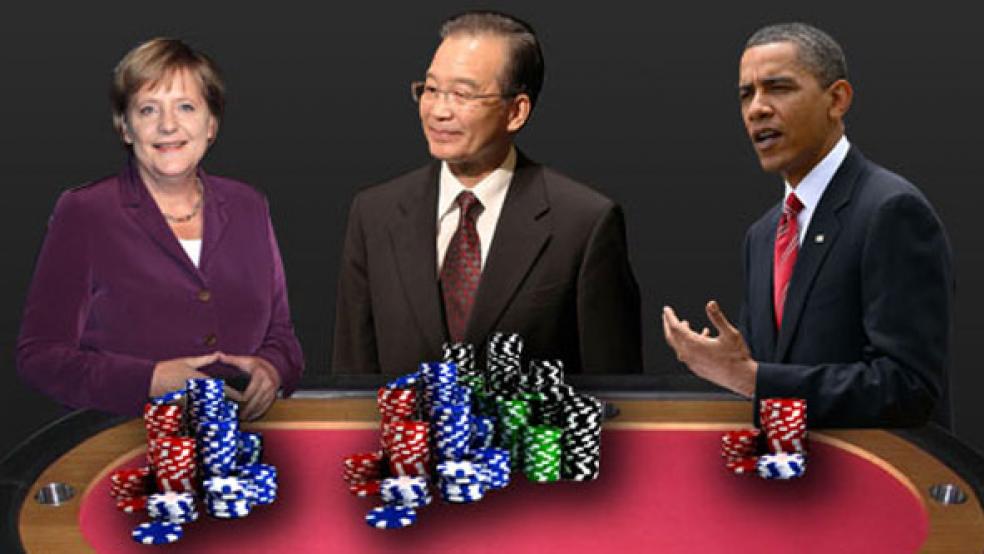Here's a game plan for the Yankees: Having been thoroughly trounced by the Texas Rangers in the playoffs, they should nonetheless demand the right to play in the World Series. They should politely explain that history and tradition are on their side and, anyway, they have the larger budget.
Sound ridiculous? Of course, but that's approximately the position taken by the Obama administration at the recent meeting of G-20 finance ministers. China and Germany have beaten the pants off us in boosting their exports in recent years, so we would like them to help us out by refiguring the rules. Specifically, Treasury Secretary Geithner continues to push China to hike its currency value, and is also pressing for a cap on exports as a percentage of GDP. Naturally, those winning the global trade race are not excited by these proposals. We accuse others of not playing fair – but in reality we have played stupidly.
Geithner's insistence that China revalue its currency implies that it is the undervalued yuan that has facilitated that country's huge accumulation of foreign reserves. Although most economists agree that China's currency would rise if allowed to do so, the Chinese would not be in a position to control the level of their currency without having stockpiled gigantic amounts of dollars, yen and other currencies. At the end of last year, the Chinese reported net external financial assets of $1.8 trillion; that compares with $276 billion at the end of 2004. They did this by aggressively penetrating foreign markets many years ago, which required a massive buildup of their export infrastructure and a politically risky pro-capitalist change in policy.
In short, the Chinese committed themselves to growth, and they have paid a price in escalating corruption, a growing divide between rich and poor, and the poisonous environmental degradation brought on by unfettered development. That said, China's leadership has raised hundreds of millions of people out of poverty and in a short time produced the world's second largest economy.
While Wal-Mart shoppers can choose among dozens of bikes made in China, most Chinese still can't afford to buy one.
Americans view this economic miracle with wonder and some envy. If asked, most people would probably conclude that China's ascendance was inevitable by dint of the country's very size. It's easy to row quickly when you have a billion people pulling the oars. China starts off with a huge internal market – naturally they can become competitive making cars or dishwashers. Of course, that is not how China came to be a major player. In fact, most criticize China for relying so heavily on exports and for not having developed their internal market. While Wal-Mart shoppers can choose among dozens of bikes made in China, most Chinese still can't afford to buy one.
China is not the only country on Geithner's punch list. Germany, too, is under the gun for … what? For earning its way to a sizeable trade surplus, which has annoyed others in the EU as well as the U.S. It is impossible to argue that Germany has profited from unfair advantages. The country does not have a large underutilized population or rock-bottom wages, and like all EU members, trades in Euros.
Germany, like China, is committed to helping business and fostering fiscal prudence. It passed several pro-business programs early in the recession to offset the impact of drooping demand, and unlike many of its trading partners, has been successful. Unemployment today is lower than before the recession. What precisely has helped Germany outperform its rivals? Let me count the ways.
The World Economic Forum's 2009 report on global competitiveness ranked Germany's infrastructure the best in the world. In particular, the country is praised for its "capacity for highly efficient transportation of goods and passengers … (and) the quality of roads and airports, the rail and port infrastructure, and this country's outstanding communications and energy infrastructure." The U.S. ranked eighth.
The World Economic Forum's 2010 competitiveness report shows the U.S. dropping two slots, but still ahead of Germany and China, which have steadily moved higher.
Next, the same source ranked Germany's legal structure second-best in the world for business, behind Sweden. The U.S. comes in sixth. On its Trade & Invest website, Germany's boosters claim that "German business law is governed by the principle of the freedom of economy, meaning that business activities don't generally require a specific permit or license." Doesn't that sound refreshing?
Here's the corker: high incentives and low tax rates. Under Germany's tax code, businesses pay about 30 percent of taxable income to the state. That compares with the top U.S. corporate tax rate of 39.6 percent in New York, for instance. Moreover, small businesses can receive cash help up front – as much as 50 percent of initial investment.
The World Economic Forum's 2010 competitiveness report shows the U.S. dropping two slots, but still ahead of Germany and China, which have steadily moved higher. In its press release, Klaus Schwab, Founder of the WEF, says that "it is more important than ever for countries to put in place the fundamentals underpinning economic growth and development." Xavier Sala-i-Martin, economics professor at Columbia, adds that "policymakers must not lose sight of long-term competitiveness fundamentals amid short-term challenges." I couldn't agree more.
Instead of screaming "it's not fair" at the other team, maybe the Obama administration should borrow from the victors' playbook. The United States can again become an aggressive competitor, and play to win. We just need the leadership, and the will, to do it.






